(Updated April, 2019)
Until recently, Korean was a rare language for Westerners to learn. But thanks to the rapid economic development of South Korea, and increasing interest in Korean culture in recent years seems to have led to more Korean learning materials being made available (I’m lookin’ at you, Korean Dramas and K-Pop).
If you’re looking for a way to learn Korean that’s more audio/video based, read our review to find out why we recommend KoreanClass101.
Unfortunately, there are still less high-quality learning resources than you can find for learning Japanese or Chinese. That said, we did find some super useful books that helped us to get started with this challenging but beautiful language.
It’s true that textbooks are no substitute for immersion into the language via culture (movies, dramas, podcasts, music), not to mention practice speaking with native speakers. However, a good textbook gives you the foundations to work with, by teaching you grammar, how to construct sentences, pronunciation rules, and how to read.
Here are 10 of the best textbooks that we’ve come across for learning Korean.
The 10 Best Textbooks for Learning Korean
1. Elementary Korean (Second Edition)
Elementary Korean is the gold standard for learning Korean by self study. It is the most thorough and all-round introduction to Korean that I know of, and the logical structure makes it easy to follow.
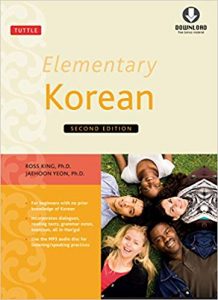
As a companion exercise book, there’s the Elementary Korean Workbook, which is really good for putting things into practice. (Note: The reviews on Amazon for this one are a little skewed because of some people complaining that their audio doesn’t work on their device, but I never had any problems.)
The higher levels in the series, Continuing Korean and Advanced Korean are also highly recommended.
Pros:
- Lessons and grammar notes are clearly presented and in a logical structure
- You’re essentially forced to learn to read Hangul (it’s not that hard!), as the roman readings aren’t given from the fifth lesson onwards
- The pronunciation guide is better and easier to understand than other textbooks
Cons:
- There aren’t a lot of pictures to break up the content so it can be a bit heavy reading
- Some people have trouble getting the CD or Audio to work
2. Korean for Beginners: Mastering Conversational Korean

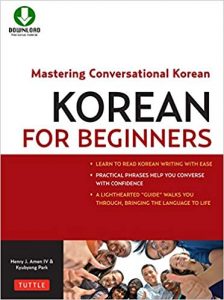
Side note: this must be the first textbook I have seen that makes use of emoticons. The times they are a-changin’! ^_^
Pros:
- Slower pace than Elementary Korean; good for learners that need more time to
- Lots of cultural information within the text
- The Authors focus on making the learning fun and interesting
Cons:
- The slower pace might be frustrating to quicker learners
- Despite the title, the focus is more on learning grammar/structure than on speaking
- Not enough practice dialogues
3. Integrated Korean Series
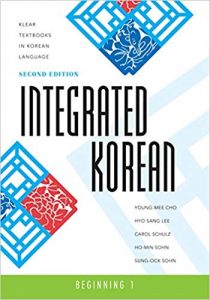
Pros:
- Lots of examples of grammar points
- Some good cultural context and authentic materials within lessons
- Has 10 volumes, so if you like this style, you can follow it all the way to advanced.
Cons:
- Can feel a bit too ‘academic’ or stuffy
- Outdated in places (older expressions)
Notes:
- Avoid the Kindle edition! (missing pages and complaints)
- Some copies being sold don’t come with the audio
4. Talk to Me in Korean Series
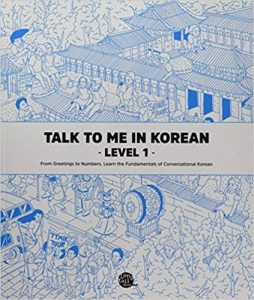
As the title suggests, the focus is on speaking right away, with minimal focus on grammar or learning to read. There’s tons of accompanying audio for you to speak along with.
In this same series, there are also additional levels and a workbook with more exercises for each level.
Pros:
- Made for absolute beginners
- Designed to get you speaking Korean fast
- Lots of audio you can use for shadowing and quizzing yourself
Cons:
- Possibly too basic if you already know some Korean (it starts with greetings like ‘hello’ and goodbye’)
- Focuses on speaking, not so much on reading or grammar
Notes:
- If you prefer learning online, you can access the same material without buying the book on their website
5. Korean Grammar in Use

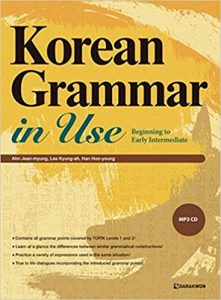
I picked this book up in Seoul so I thought it might be tricky to buy online (update: I found it for sale on Amazon).
Pros:
- Probably the best Korean grammar textbook out there
- Focuses on understanding the structures and constructing your own
- Most people like the structure of the book (look up things on a need-to-know basis)
Cons:
- Not for beginners — you’ll need a decent foundation of Korean before this will be useful
- You should know how to read Hangul before using this book
6. Korean Grammar for International Learners
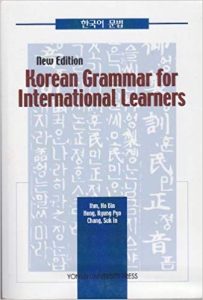
One of the best points of this book is that each grammar point is packed with example sentences. Reading the examples really helps the reader to understand the point and see how it’s used.
Pros
- Comprehensive, and covers most grammar points you’ll need
- Not bogged down with too much technical language; instead uses multiple examples to demonstrate
Cons
- No romanized writing (you’ll need to learn Hangul first)
- Not for beginners of Korean
- If you don’t know English grammar to start, this might be difficult
7. 500 Basic Korean Verbs
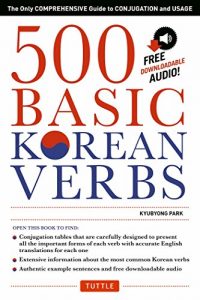
You can check out our full review of the book here but here are the bullet points…
Pros:
- Romanization is provided
- Example sentences to demonstrate verbs
- Smart layout and organization
Cons:
- You probably won’t find the high-level verbs used in your favorite Korean Drama
- Unnecessary romanization (if you already know Hangul, it can be distracting)
- Example sentences difficult for true beginners
8. Klear: Korean Reader for Chinese Characters
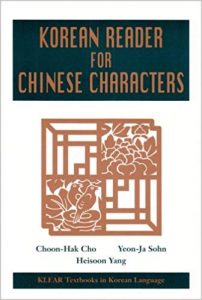
This book teaches you the most common 500 hanja by frequency of usage in modern Korean. It’s a good choice if you want to learn to read Korean literature or you’re simply curious about the Korean hanja like I was.
Notes:
- Not for the average beginner
- Stroke orders included in the appendix
- Reading selections to demonstrate the hanja
- Covers mnemonics to learn the different characters
9. Spoken World: Korean
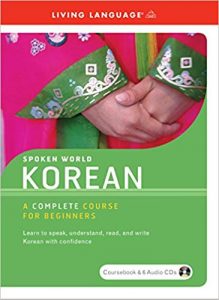
There are six CDs included with a separate course book. The dialogues are easy to understand and introduced in a logical order. You won’t get much grammar from this one but it’s a nice little audio course. Highly recommended.
Notes:
- Made for absolute beginners
- Good for listening while in transit
- Conversations feel natural and useful
10. Pimsleur Korean
This one might be a bit controversial (why so much hate on Pimsleur??), but here goes…
A lot of people find Korean a difficult language to pronounce correctly. The sounds are “different”, which can make listening quite challenging. In this respect, it was certainly much harder for me to get started than Japanese or even Chinese.
In this Pimsleur audio course, the Korean speakers break down every syllable of each word which helps train your ear. Keep with this course and you will be speaking and understanding whole Korean sentences within a few days.
You can try out Pimsleur Korean for free with an Audible 30 day trial. Download a taster course here.
Side note: Audible is AMAZING for learning anything, not just languages. I listen to audiobooks probably 30% of my day, when I don’t need to be 100% focused: when I’m on the train, doing the dishes, etc.
So there you have it. Those are the 10 best books we have found so far for learning Korean. Do you know of any other quality resources? Leave a comment below!
If you would like to keep up with our updates, follow us on Facebook
Michael has lived in Japan on and off for almost 10 years. He loves studying Japanese, and is currently working on going from N2 to N1 on the JLPT.
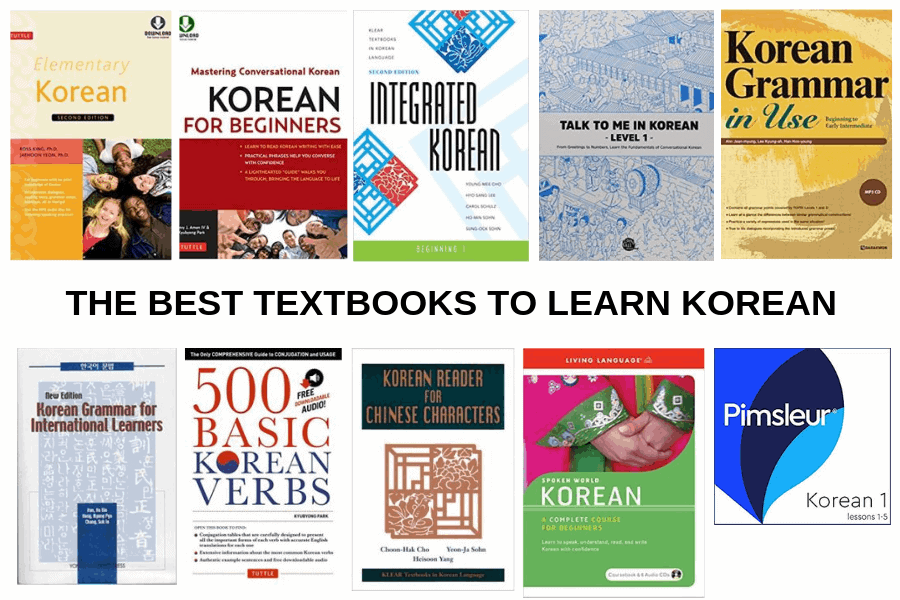

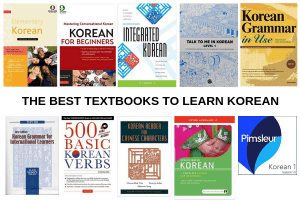
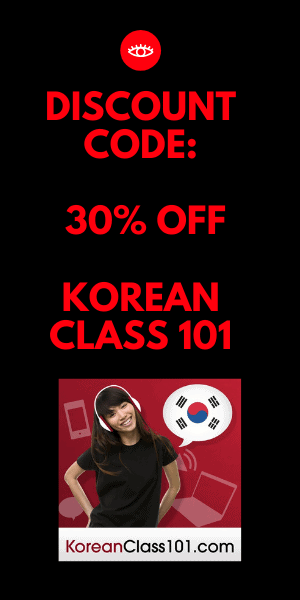
If you’re learning Korean, will you come to my blog? By the way, online Korean bookstore twochois.com and seoulselection.com ship internationally. Personally I think textbooks published by Korean publishers are better then the ones published in US.
Hi. Thanks for commenting. Which textbooks would you recommend to our readers?
HI i have a question! I was wondering if you know any books or the ones you mentioned have any “Slang” talk or informal language like how people will normally talk on the streets you know? Instead of being like “Hello my name is Blank, how are you? I am fine thank you” instead be like “Hi im Blank what are you up to?” u know things like that ^^ i was just wondering cause next summer im going to be (hopfully) attend a korean HS and i dont want to be only learning formal language Thank you! and thank u for posting i think i want to try and pick up “Spoken Korean” and “Korean For Beginners ” 🙂
?????! ^^
As a Korean, it’s good to see that you’re recommending Korean studying books!
Have a good day~! ???? ????!
I actually wrote some Korean on there, but they were replaced with question marks. 0-0
Anyway, thanks!
Hi Gigi. Thanks for your comment!
How about Making out in Korean? https://amzn.to/2IqEza7
I have this book for Japanese and it gave me (and Japanese locals!) a lot of laughs! I have the Korean one too but I haven’t really used it yet.
Hi Rika. Yeah it’s an issue with the blog software. Anyway, thanks for commenting! Feel free to drop by again 🙂
Hi,
Thanks for the recommendation, I find it useful to me, as I am a beginner and looking for a suitable book to start learning Korean.
I notice some of the text book in the market actually teaching in latin script (romanization of Korean) instead of Hangul, but I still prefer Hangul, as I can learn reading their word at the same time.
Among the books which you recommended above, may I know which one is using Hangul? Thank in advance 😀
They all use Hangul. I wouldn’t recommend books that use romanized letters especially considering that learning the Hangul is so easy.
nice! I like the KLEAR textbooks
My biggest concern is self-taught. I love korean culture and language and I’ve been trying to learn wrighting,reading and convercing in hangul, but since I’m only 16 it’s really hard to get a grasp on and not to easy to find textbooks or such at a library. Especially the ones I’ve been to. What can I do?
i want to study Korea more .
can you help me for study cos now i need the good Korea’s book . you can send the book by my email for me if you can help. thank you for your help…
Where did u get theses books from?im trying to buy them from somewhere.
Thank you for that great list. I am still a beginner and therefore those books are exactly what I am looking for. I might get myself Korean for Beginners: Mastering Conversational Korean and one of the Grammar Books. It is always very important to know the grammar of a (new) language! It really enables you to learn much faster if you can master the grammatical aspects of a language.
I’m self-taught as well and had the same problem as you. It took me forever to find something suitable for me. If you haven’t already, I would recommend checking out Talk to Me in Korean (TTMIK) at http://www.talktomeinkorean.com/. They have a ton of great lessons (if you don’t mind starting in short-lecture format), workbooks, and other support material. So far it’s the best free material I’ve run across (although you should consider donating later if you have a bit to spare). On the other hand, if you want a direct exchange partner, I would recommend mylanguageexchange.com. It’s free and so far everyone I have met has been nice and helpful. BUT, if you’d rather practice writing, I would suggest a forum like lang-8.com. They have a fantastic set up for the free membership and you get corrections directly from native speakers. If you would like to discuss more, just drop me a line~ Keep at it!
Dear Admin,
I’m the Marketing Manager for Tuttle Publishing Languages. Thanks for reviewing so many of our Korean books! If you would like to see any of our newer titles, I would love to send you some review copies. In particular, Kyubyong Park, the author of Korean for Beginners, has a Korean grammar book which will be out next year.
Thanks,
Mike
What do you think about the Integrated Korean textbook?
This one: http://www.amazon.com/Integrated-Korean-Beginning-Textbooks-Language/dp/0824834402
Do you think it would be a good start for an absolute beginner?
Thanks 😀
Hi, I’m English and I’m 12 and I’m trying to teach myself Korean so which textbooks are the best for me (I already know some Hangul). I want to good in all fields (reading,writing,speaking and listening).
i would really like someone send to me in email korean learning sites (best) or i would really like internet learning book in gmail.com it would be the BEST!
My gmail.com –
[email protected]
Thank you 🙂
Hi may I ask if do I need to buy all those books ? and where can I buy it ? waiting for your reply .. Thanks ^__^
Hi thank you for the book info, I am going to attempt Korean and needed to inform myself about the different learning materials . I have lived in Germany 10 years and learned the language without actually sitting down to study it however I was a lot younger then , have since lived in japan and also learnt japanese this time though i studied it from the beginning . I have used a number of different methods including lingua phone , kumon etc highly recommend Kumon if you want to read and write. wonder if there is a similar correspondense course for Korean ? again thanks for your help.
The ease of learning Hangeul is misleading. Korean displays the same, if not so severe, disjunction between graphic and spoken forms. Romanization, particularly the highly readable older McCune–Reischauer system, is a much closer match to actual Korean pronunciation. The rules of liaison, elision, assimilation, etc., especially in concert with the block-arrangement of syllables, present exceptional barriers to the necessary process of absorbing semantic and syntactic content right off the page. What small discrepancies in pronunciation that remain are obviated by the process of studying silently.
People, even those who developed their Korean through Romanization, who recommend in favor of exclusive Hangeul, even for beginners have forgotten the long climb up the mountain in their early months.
The matter is only partly mitigated by the almost universal availability of recordings with every course: the naive beginner—especially entirely self-studying—hearing ‘hamnida’ may not immediately assimilate it and may rather unconciously favor the clear Hangeul written evidence of ‘hap/bnida’, although that’s a rather obvious example that many books would single out for illustration of nasal assimilation.
When i did Korean in university, I didn’t bother with romanization, and went straight for the native orthography. All the other students were scribbling out crib-notes in transliteration, not even the more accurate romanization, for in-class convo practice sessions, and they quickly got far ahead of me. This in spite of the fact that they were using the magisterial King/Yeon textbook (King taught there, incidentally), which had no love lost for romanization of any sort. Nor was it a class of dummies; this was a high-end course and most of us had experience in other languages already, many in Chinese and Japanese. It’s just that they had enough sense to cross the stream at its narrowest point.
I strongly recommend getting a book that uses romanization; it is especially valuable for dialogue scenes, vocab, and grammar explanations. You won’t spend your time wading laboriously through the surface, graphic, nuances of Hangeul, and you will be the more effortlessly assimilating the deep structure—the meat—of what spoken Korean is really about.
hi need the best effort less book of Korean for learning Korean language can you help. thanks
@danR,
Hi there! I agree with all that you say. I’m also looking for a textbook with both romanisation and hangeul so that I can learn where all the sound changes occurred and hopefully not make silly mistakes in pronunciation. I am also looking for textbooks that give the literal word for word translation so that a learner can quickly get used to the word order differences. The Hollym phrase books have hangeul, romanisation, regular English translation as well as a word for.word version to show real word order. 4 lines of text per phrase. Unfortunately, they are not grammar books or textbooks.
Could you kindly recommend text or grammar books that are in this format? Are the Living Language, the Teach Yourself or Colloquial series any good? Thanks.
You have alluded to what is mysteriously missing from every course I’ve ever seen: a full word-by-word, morpheme-by-morpheme parsing of Korean input. Without further ado, I’ll give what I consider the ideal book (or online source for that matter):
1. Big format text. Like the Elementary Korean textbook’s workbook.
2. Emphasis on dialogue. A language book should be a near-continuous mass of conversation, with following grammar discussion illustrated therefrom.
3. De-emphasis on exercises.
4. Big letters for Hangeul for the first 20 pages or so.
5. Parallel, but lightly integrated initial development, of Hangeul.
6. Parallel columns of Romanization and Hangeul. Even in an intermediate book, the transcription should be available at least at the back of the book.
7. Repeat definitions for words in following dialogues: sure, people do forget words. They should reappear at least once after introduction in a previous dialogue, especially function-words and morphemes, like -e, -i, -un/nun, etc.
7. Fully transcribed Romanization from the recordings. Jaehoon Yeon, co-author of Elementary Korean, came rather close to this in his ‘Teach Yourself Korean’ book, with Mark Vincent.
8. Parallel parsed grammar. None of this ‘literally means:’ nonsense, where you don’t get the ‘literal’ meaning at all. If people want to genuinely understand even Korean idiomatic expressions, they are still entitled to a genuine seriatim parsing of each morpheme. What does ‘annyeonghaseyo’ mean, in exact order? It does have a pragmatic communicative sense, but it derives that from the meaning of each morpheme. It does not detract from the assimilation of the intent of the greeting to explain it, and it does give insights into how the language works.
8. Nothing missing, everything immediately visible. It’s exasperating to find missing definitions, missing explanations, missing entries in indices, having to search online with Google Translate (and its idiosyncrasies) or Naver, et al., and still find a key particle is not included in the translation of a passage. Naver is generally better than Google, but it would still do that sort of thing to me over and over again.
I’m not very familiar with the later editions of Teach Yourself Korean, but I recall they added Hangeul to the text, while retaining the Romanization. I can’t recommend any grammar book, because any serious grammar book on Korean will use little, if any, Romanization. That’s the nature of the beast. Only serious students of a language will study the grammar in depth, and they will want to learn the script of that language as well. The only grammar stuff you will see romanized (in IPA, that is) are linguistic texts and articles, intended for a linguistic audience, in which case the grammar discussion itself will present an almost impenetrable avalanche of linguistic terminology.
I think the older Teach Yourself Korean (2003) was the best option, (the audio CDs are essential, incidentally) but it had its defects, and some typos. I also think the Monash University “MyKorean” is pretty good. Romanization and Hangeul are available throughout for the dialogues, but the rest is almost all Hangeul.
Here’s an updated reply: Teach Yourself Korean has been re-issued last year as Complete Korean, and according to the blurb has apparently been done completely in Hangeul (Say it ain’t so, guys; Hangeul-only does nothing but weed out all but the strong, and leave the other 75% frustrated and unhappy; and quitters who would otherwise have gone on to be fluent Koreanists; and they would eventually go on to learn to read Hangeul anyway, believe it.). The 2010 edition introduced more Hangeul, but in my opinion the older 2003 TYK had it right, in spite of its venial structural oddities: you have to comb before and after a chapter or the grammar sections to fit the final 10% of a dialogue together. This is more annoying than it sounds. That 10% represents as much as the assimilation of the rest of the convo put together, and sometimes you’ll have to scour Google translate or Naver to get the whole thing.
If this forgivable mis-construction/oversight has not been fixed and has been superadded to the Hangeul-only format, then it’s not likely I could recommend the latest version to anyone, outstanding credentials of the authors notwithstanding; they’ve fallen into a pedagogical black hole.
Dig up a pre-2010 edition of Teach Yourself Korean in a used bookstore, find it on Amazon, or a library or something. Be sure to get an audio version. Too much of the recordings go too fast, but once you’ve absorbed the first 10 chapters dialogues, you can go back and start piecing together the spoken material.
(You can do better with the audio by downloading the free app “Audacity”, an excellent sound display and manipulation tool, used by many audio professionals. It will take about an hour to figure out the basic functions, but just those will greatly enhance the ways you can step-through, repeat, slow the tempo (degraded pronunciation, but great intelligibility, then you can listen again at normal speed) and the like. I recommend Audacity for any language-learner. PRAAT is also useful, but a bit daunting for non-linguists).
Also, don’t pay to much attention to the exercises and whatnot. Do them later. Just make sure you’ve got all the dialogues down pat. And do practice the Hangeul, but do it incrementally, and in parallel. Remember that Hangeul does not represent anything like Korean spoken on the street. It does better than English written-to-spoken, but that’s not saying much; English has that differential just too horrible for words. I want to say this because Koreanphiles seem only too willing to regard the script as manna fallen from heaven. It has its felicities, and keyboard layout in Korean is as well-planned as the characters. It’s just that Hangeul doesn’t bear enough resemblance to real spoken Korean to matter, Romanization is substantially better, aligns more fluidly with audio in a course, and again, allows a much faster assimilation and internalization of the syntactic, morphological, grammatical, semantic, etc., content: the critical material that is converted to surface form for production, and perception, in conversation.
You might consider finding a Korean friend who can explain some of the words you can’t track down in the book, or do a language-exchange thing with Koreans wanting to learn English, or talk to a native tutor once a week for an hour. They can clarify anything that you can’t figure out. But you may wind up with more advice than you need or can use, so use the time judiciously.
There have been dozens of Amazon and other reviews of TYK up to and including the 2010 edition, but I can’t go through all the complaints and defects that have been reported. I’ve given what I consider the most problematic areas, but have not found it ridden with errors (one reviewer), or that the audio doesn’t correspond to the text, (I’ve listened to it, the dialogues match the audio, perhaps some lot was mis-packaged or something). And of course, some people just plain don’t like the methodology, there will always be those. The fact is that Korean is one of the hardest languages in the world, and to some extent you’re going to escape the frying-pan for the fire. Korean was rated just behind Japanese, as a Category III language for trouble for Anglophones by the U.S. State Department, and this assessment was re-confirmed by an unclassified NSA study. If we leave out the incredibly difficult Japanese script, that was a factor in the assessment, Korean is probably equal to Japanese in difficulty.
So, if you stick with it, with a non-ornery course like the old TYK, and start talking to Korean people, you have done yourself proud.
Having said all that, the takeaway message is that the Romanization throughout in the older Teach Yourself version is more convenience than the aforementioned annoyances are a drawback; and of the commercial courses, will probably take you the furthest toward actual fluency by means of more advanced material. I’m not going to compare with Rosetta, Rocket, Pimsleur, etc. That’s a whole ‘nother battle.
Finally: an informal survey found that of students of Korean who actually become fluent communicators in the language, and not quitters or language-learners-but-never-finishers, the fewest of them learned through college/university courses. I’m afraid courses of the sort employing the Ross King/Jaehoon Yeon Elementary Korean textbooks and the like, and almost every other language courses (I took enough of them in university, so I feel the pain) in university have contributed greatly to this high attrition.
@danR,
Wow! Thanks for those 2 wonderful posts. I apologise for the late reply as I wasn’t watching this page after a while.
I agree with many of your perceptive insights into this subject. I’ve come across some books that claim or attempt to give word for word translation of the korean words in a sentence but frequently fall short by oft times giving their own idiosyncratic turn of phrase re-rendering that detracts from the actual dictionary meaning of a particular word. Some do the word for word thing pretty well but have no romanization or have it only for a few chapters.
I think I have one of the previous versions of TY Korean that has full hangeul / romanization for the dialogue part at least. I think I’ll also get a copy of Colloquial Korean as well. It also has hangeul and romanization for the dialogues at least. The grammar explanations seem to be a curious mix of hangeul only or romanization at times. I think my coping strategy would be to deface my copy of these books by transcribing the romanization where needed to facilitate faster reading and memorisation of important vocabulary and syntactical elements.
I wish someone with your insights would be in the editorial team of every language learning book about to be published so that the needs of the learner would be seriously addressed. Thanks again for taking the time to answer my questions and for offering your wonderful insights.
Warmest Regards,
Tian Soon
I recently started learning Korean for a business trip to Seoul. I came across Get Talkng Korean, an audio based course with a downloadable course book that really helps learn the language you actually need for a trip to Korea and quickly. It isn’t academic, unlike the other available books, and really gave me the phrases I needed. I recommend it!
I wanna study korean more.. And I want a help on what book should I buy.. Thanks for helpiNg
I know a little about korean language and I want to learn more ..it would be a big help if u can recommend a book.. Thanks
I want to start learning Korean – I am a beginner- and I want to know which of these books are the best :
•Korean from zero
•integrated Korean
•Korean for beginners
Get them all. Use them all. Invest in your learning.
I use http://www.howtostudykorean.com and I am LOVING it!
Hi i’m Bangladeshi.I speak in bangla.I’m also interested in korean language but i have no idea about it so as a beginer which one will be healpful for me?
I came across your site while searching for textbooks to teach English to Korean speakers. When I was learning Korean, we used the KLEAR textbooks (University of Hawaii Press). Having studied a total of four foreign languages, these books and supporting materials (workbooks, mp3 files, etc) were among the best I have ever come across. In fact, the books are so good, that all you really need is an answer key to the workbooks in order to skip the classroom altogether & just use them on your own.
If you study Korean by yourself, and want to SPEAK, try this book.
http://www.koreanfashionista.com/korean-books/korean-grammar-speaking.html It has just published and has a lot of worksheets, vocabulary list, tests, and answers. Every grammar is simplified so you just have to “plug in the pieces”.
What if I dont have an answer key? Can I still skip the classroom? Or do they sell the answer key?
Sorry if this sounds silly but exactly what do you mean by “plug in the pieces”?
I started to learn Korean too, only since few weeks. I can tell you that learning with ‘Talk to me in Korean’ is really fun. Loads of audio lessons, workbooks, textbooks, videos.. some are free, the others not, but still affordable. You can follow them also on Facebook. Really enjoying every lesson.
Hi, may i ask where you buy these books from? I’m really interested in learning korean but i have no idea where i can buy these textbooks from 🙁 by the way, this was really helpful!
Hello!!! I was wondering about Hanja… I know kanji characters from taking Japanese courses and I know that the pronunciations are different between Korean, Japanese, and Chinese languages, but Hanja and Kanji characters all have the same basic meaning right? LOL just double checking before I go and buy another book… Thanks!
amazon has a lot of them for cheap
yes.. there are .. but I know its tooo late ..sorry … hhh
Nice book
Try “KOREAN SLANG: KOREAN SLANG: AS MUCH AS A RAT’S TAIL”
https://amzn.to/2DgeOFi
Hello, do you allow guest posting on perapera.org ? 🙂 Please let me know on my e-mail
How long would you say learning korean takes ? And how many hours a week would i have to study?
I love http://howtostudykorean.com and http://domandhyo.com
The first one is really in depth and simple to follow. The second is good for beginners and learning in a fun way. Thanks for this post!
Hi! I am in South Korea for a month and looking for Ewha and Sogang books. Do you have any idea where to get them in Seoul? The universities’ pages don’t sell them(at least not on their web page). Amazon it would be my last resort, but they are overpriced. Lots of korean learning books and workbooks are a lot more cheaper than buying in Europe or USA. I have bought Active Korean 1 by Language Education Institute, Seoul National University for $30 – actual price is KRW 15,000. Active Korean is actually a very good book to learn from, not very stuffy, 2in1- book and workbook. Due the fact that I visited more than 10 times, I would prefer to buy the books here, in Seoul. I will try my luck in book stores these days.
I’m so glad that I find something for this..
I’m from Finland and wanna learn Korean language.
Thank you so so much
Sir i need learn korean language in to tamil book…
Hi Lina, thanks for the suggestion. We finally got around to reviewing the Integrated Korean and put it on our updated list (above).
it is very much helpful for a beginner like me
Glad we can help Jessa. Good luck with your Korean study!
Hello, I was just on your website and filled out your feedback form. The contact page on your site sends you these messages via email which is the reason you are reading my message right now right? This is the most important accomplishment with any type of online ad, getting people to actually READ your message and this is exactly what you’re doing now! If you have an ad message you would like to promote to lots of websites via their contact forms in the U.S. or to any country worldwide send me a quick note now, I can even target particular niches and my costs are very affordable. Write an email to: [email protected]
how to still read a bookk, eventhough ratusan lembar